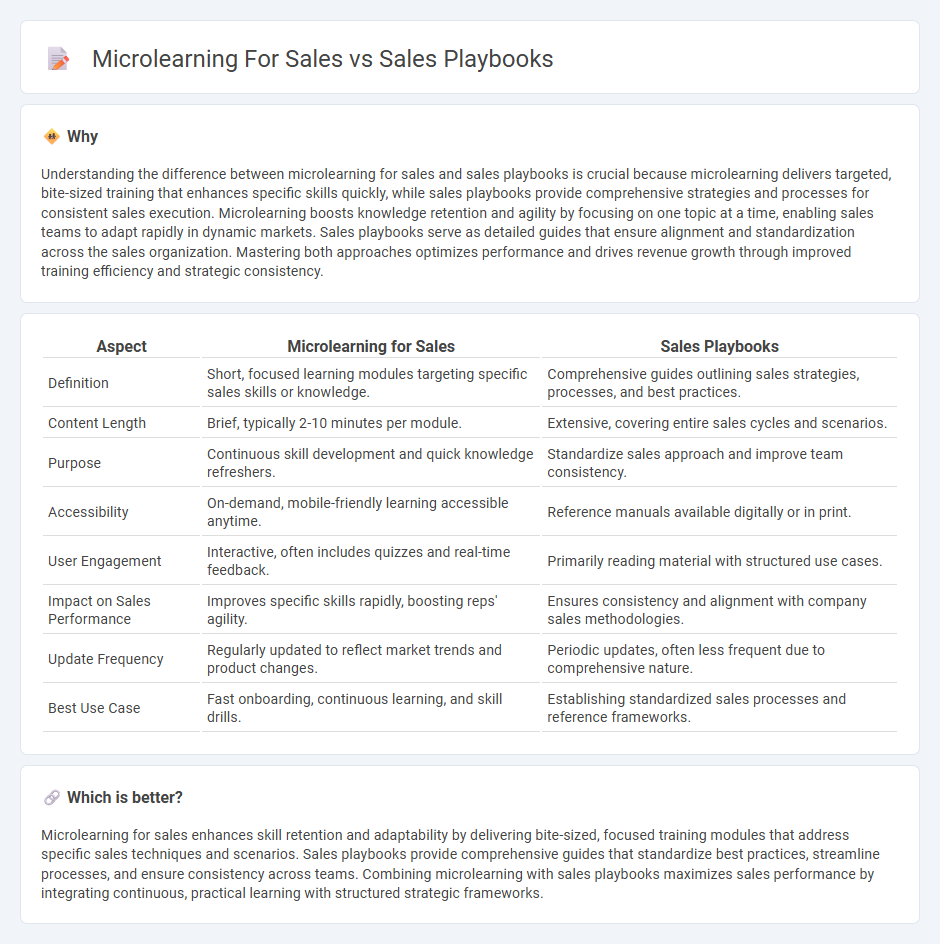
Sales microlearning delivers focused, bite-sized training modules that enhance skill retention and adaptability in fast-paced environments. Sales playbooks provide comprehensive, step-by-step strategies and scripts tailored to various customer interactions, ensuring consistent messaging and best practices across teams. Discover how integrating microlearning and sales playbooks can elevate your sales performance and drive revenue growth.
Why it is important
Understanding the difference between microlearning for sales and sales playbooks is crucial because microlearning delivers targeted, bite-sized training that enhances specific skills quickly, while sales playbooks provide comprehensive strategies and processes for consistent sales execution. Microlearning boosts knowledge retention and agility by focusing on one topic at a time, enabling sales teams to adapt rapidly in dynamic markets. Sales playbooks serve as detailed guides that ensure alignment and standardization across the sales organization. Mastering both approaches optimizes performance and drives revenue growth through improved training efficiency and strategic consistency.
Comparison Table
| Aspect | Microlearning for Sales | Sales Playbooks |
|---|---|---|
| Definition | Short, focused learning modules targeting specific sales skills or knowledge. | Comprehensive guides outlining sales strategies, processes, and best practices. |
| Content Length | Brief, typically 2-10 minutes per module. | Extensive, covering entire sales cycles and scenarios. |
| Purpose | Continuous skill development and quick knowledge refreshers. | Standardize sales approach and improve team consistency. |
| Accessibility | On-demand, mobile-friendly learning accessible anytime. | Reference manuals available digitally or in print. |
| User Engagement | Interactive, often includes quizzes and real-time feedback. | Primarily reading material with structured use cases. |
| Impact on Sales Performance | Improves specific skills rapidly, boosting reps' agility. | Ensures consistency and alignment with company sales methodologies. |
| Update Frequency | Regularly updated to reflect market trends and product changes. | Periodic updates, often less frequent due to comprehensive nature. |
| Best Use Case | Fast onboarding, continuous learning, and skill drills. | Establishing standardized sales processes and reference frameworks. |
Which is better?
Microlearning for sales enhances skill retention and adaptability by delivering bite-sized, focused training modules that address specific sales techniques and scenarios. Sales playbooks provide comprehensive guides that standardize best practices, streamline processes, and ensure consistency across teams. Combining microlearning with sales playbooks maximizes sales performance by integrating continuous, practical learning with structured strategic frameworks.
Connection
Microlearning enhances sales effectiveness by delivering concise, targeted training that aligns with sales playbooks, ensuring reps quickly absorb key strategies and product knowledge. Sales playbooks provide structured guidance and standardized processes, while microlearning modules reinforce these principles through easily accessible, bite-sized lessons. This combination drives consistent sales performance and accelerates skill development in dynamic market environments.
Key Terms
Sales Process
Sales playbooks provide comprehensive, structured sales process frameworks that guide representatives through each stage, ensuring consistency and alignment with organizational goals. Microlearning breaks down the sales process into bite-sized, focused modules, enabling quick skill acquisition and on-the-go reinforcement of key tactics and techniques. Explore how combining playbooks with microlearning can optimize your sales process efficiency and effectiveness.
Just-in-Time Training
Sales playbooks provide comprehensive, structured content that guides sales reps through processes and strategies, ensuring consistency and alignment across teams. Microlearning delivers targeted, bite-sized training modules designed for Just-in-Time knowledge, enhancing retention and immediate application during sales interactions. Explore how integrating both methodologies can optimize your sales training for maximum effectiveness.
Consistency
Sales playbooks provide a structured, consistent framework for sales teams to follow, ensuring uniform messaging and replicable best practices that drive predictable results. Microlearning offers flexible, bite-sized training modules that can be consumed on-demand, but may lead to fragmented knowledge if not aligned with a centralized strategy. Explore how combining sales playbooks with microlearning boosts consistency and accelerates skill mastery.
Source and External Links
Sales Playbook Guide: Examples & Templates for Success - A sales playbook is a comprehensive guide outlining customer personas, selling strategies, and best practices, tailored to specific industries and sales scenarios like B2B tech sales, retail seasonal strategies, or startup product launches.
My Ultimate Q4 Sales Playbook: Real-Life Tactics to Help ... - A sales playbook should include a company overview, selected plays, product details, and a clear sales process with data-backed winning strategies for different buyer personas, supported by key performance indicators for effectiveness.
Sales Playbook: Best Examples & Template - Effective sales playbooks map the buyer and seller journey by stage, identifying conversion points and best-performing tactics, enabling reps to better navigate challenges and learn from top performers' successful plays.
 dowidth.com
dowidth.com